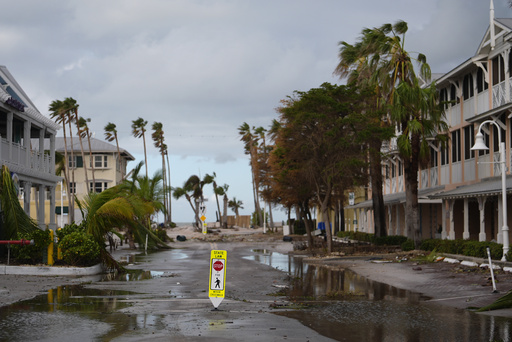Thousands of flights have been canceled across the United States this week as Hurricane Milton made its way into the Gulf of Mexico and caused significant damage in Florida. Many airports in areas affected by the storm were forced to shut down, leading to a massive wave of cancellations. As tracked by FlightAware, there were over 2,270 flight cancellations reported by Thursday afternoon, following nearly 1,970 cancellations the previous day.
After impacting southeastern regions of the U.S. and parts of Cuba on Wednesday, the hurricane has since moved into the Atlantic Ocean, though threats remain. Officials have issued storm-surge warnings for much of Florida’s east-central coastline and extending northward into Georgia, in addition to tropical storm warnings that affect South Carolina. These warnings suggest that disruptions in travel are set to persist across the region.
While airlines cannot alter weather patterns, they are obligated to issue refunds for flights that are canceled. Earlier in the week, President Biden and other officials cautioned businesses against exploiting the situation by hiking fares, a concern raised by travelers experiencing unexpectedly high ticket prices. Airlines defended their actions, noting they have implemented fare caps in recent days.
For travelers affected by cancellations, monitoring weather updates and checking flight statuses is crucial. The extent of Hurricane Milton’s devastation is still being evaluated, and some parts of Florida have suspended commercial operations, evidenced by closures at Orlando International Airport and Tampa International Airport on Thursday. However, Orlando announced it would begin allowing some flights later in the evening and plans on resuming departures Friday. Tampa also indicated it would reopen operations on Friday. People have been advised to remain indoors and await clearance from authorities before venturing outside.
“If you are traveling from Florida, please do not go to the airport unless it is safe and open,” the U.S. Transportation Security Administration advised on social media. “Always confirm your flight status with your airline.”
Despite Florida being most severely impacted, travel disruptions are being felt nationwide. Travelers outside the storm’s impact region may have alternative routes available, although availability might be limited. Therefore, it is prudent to verify with airline apps or websites to confirm flight statuses before heading to the airport, as airlines tend to cancel flights well ahead of their scheduled departures.
With nearly two months still remaining in the Atlantic hurricane season, the possibility of additional severe storms looms. Travelers should stay informed by keeping an eye on weather forecasts leading up to their trips.
When faced with flight cancellations, it is recommended to contact your airline directly. Although airlines typically attempt to rebook passengers automatically, delays may occur as companies work to recover from the hurricane’s impact, necessitating that passengers take initiative and seek assistance. For those already at airports, finding a help desk might involve long waits due to high passenger volume. Experts suggest calling the airline’s customer service, and using international help-desk numbers can sometimes facilitate quicker connections.
Utilizing the airline’s mobile application can offer up-to-date information regarding flight statuses that might not be available at the terminal.
Travelers may wonder if they can request rebooking on another airline’s flight. While this option exists, airlines are not your allies in this regard, as they are not mandated to place you on a different carrier’s service. Major airlines, with the exception of Southwest, may provide options to book you a spot on a partner airline, though this can vary. It’s also beneficial to examine alternative flight options as you await communication from an agent and to consider searching for flights from nearby airports.
Regarding refunds, passengers whose flights are canceled are entitled to a full refund through the payment method they originally used to purchase their tickets, irrespective of whether the tickets were labeled non-refundable. While a refund might not appeal to some travelers wishing to reach their destinations, purchasing replacement tickets on short notice can often lead to higher costs.
As for any additional compensation for costs incurred during travel delays or cancellations, U.S. law does not mandate extra reimbursements. Airlines establish their own policies regarding reimbursements for stranded travelers for expenses like hotels and meals. However, the Biden-Harris administration is actively seeking changes to these policies. Previously, the Department of Transportation has underscored that many travel disruptions are deemed the airlines’ responsibility, pushing companies to provide support for affected passengers.
“We have reminded the airlines of their responsibilities to care for passengers during major delays,” Transportation Secretary Pete Buttigieg highlighted earlier in the year, reflecting on widespread cancellations due to a technology malfunction in July.
The Transportation Department also maintains a “dashboard” that displays what each airline commits to covering during travel disruptions.
